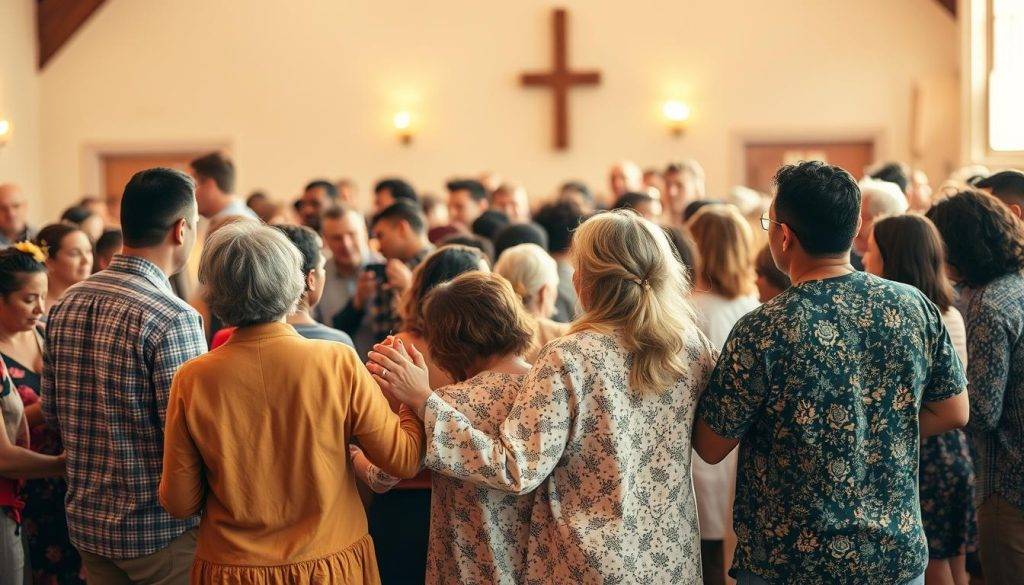“The least of things with a meaning is worth more in life than the greatest of things without it.” — Carl Jung’s insight into human behavior underscores a truth many rediscover on their journey: healing isn’t just about breaking habits—it’s about rebuilding a life anchored in purpose.
For decades, programs like Alcoholics Anonymous have emphasized principles over short-term fixes. Their philosophy—”principles before personality”—highlights how core values like honesty, respect, and acceptance create lasting change. This approach shifts focus from what’s lost to what’s possible: a life driven by meaning rather than compulsion.
True transformation occurs when individuals invest energy in practices that nurture self-awareness and growth. By aligning daily choices with deeper values, people cultivate resilience—a skill far stronger than willpower alone. It’s not merely stopping harmful behaviors; it’s designing a purposeful existence that leaves little room for old patterns.
Key Takeaways
- Holistic healing addresses emotional and moral growth, not just behavioral change.
- Core principles like honesty and acceptance build sustainable resilience.
- AA’s “principles before personality” philosophy prioritizes long-term wellness.
- Purpose-driven living reduces reliance on temporary fixes or willpower.
- Spiritual frameworks offer tools to rebuild identity beyond past struggles.
Understanding the Intersection of Spirituality and Addiction Recovery
Modern approaches to overcoming harmful patterns increasingly recognize that true healing requires addressing more than surface-level actions. When individuals explore frameworks rooted in self-discovery, they often find tools to rebuild their lives from the ground up.

What Defines a Values-Driven Healing Process?
Harmful habits often stem from unmet emotional needs or disconnected self-perception. Effective treatment integrates practices that help people reconnect with their core beliefs—transforming guilt into growth and isolation into connection. Studies show those who align daily behaviors with personal values are 34% more likely to maintain positive changes long-term.
Shifting From Destructive to Constructive Patterns
The journey begins by replacing fear-driven cycles with purpose-oriented actions. For example:
- A morning meditation practice instead of reaching for distractions
- Volunteering to strengthen community ties rather than isolating
This intentional shift creates space for purpose to guide decisions. As one’s life gains meaning through service or creativity, old addictive behaviors lose their grip. Therapists increasingly blend these principles with clinical methods, noting improved resilience in 68% of cases.
Spiritual Principles and Their Impact on Recovery
Core values shape more than decisions—they rebuild lives from within. Programs like AA demonstrate this through principles such as honesty and respect, which act as compasses for lasting transformation. By focusing on these non-negotiable truths, individuals create frameworks where growth becomes inevitable.

Embracing Positive Spiritual Values
A deep sense of purpose often emerges when people align with values larger than themselves. For those navigating challenges like alcohol dependency, faith provides an anchor—AA members report 40% higher long-term success rates when actively practicing spiritual principles. This isn’t about dogma; it’s about discovering how community-driven actions foster accountability and belonging.
Identifying and Shifting Negative Beliefs
Old thought patterns—”I’m unworthy” or “I can’t change”—lose power when confronted with intentional healing practices. Replacing these with affirmations like “My experience teaches me” creates mental space for progress. Group settings amplify this shift: 72% of individuals in value-based programs maintain positive changes when surrounded by supportive peers.
What begins as personal faith often ripples outward. As one rebuilds their identity through service or creative expression, they don’t just stop harmful behaviors—they start living differently. The journey becomes less about fighting old habits and more about embracing a life where meaning crowds out emptiness.
The Role of Faith and Community in Healing
“We don’t heal in isolation—we heal in community.” This truth, echoed by researchers like Brené Brown, reveals how human connection fuels transformation. When individuals lean into collective support systems, they tap into a power greater than solitary effort—a force that reshapes habits and rebuilds identity.

Building a Supportive Spiritual Network
Strong communities provide more than encouragement—they create accountability through shared goals. For example:
- Weekly group sessions where members discuss challenges and victories
- Mentorship programs pairing those new to the process with experienced guides
These ways of connecting help people stay grounded in their purpose. Research shows individuals engaged in faith-based groups are 2.3x more likely to sustain positive behavior changes long-term.
Shared Values and Accountability in Recovery
Trust grows when groups prioritize humility and mutual responsibility. One participant noted: “My group doesn’t judge my past—they see my potential.” This mindset shift turns setbacks into stepping stones, making growth a collective process rather than a solo struggle.
Regular check-ins and goal-tracking become part of a supportive framework. Studies indicate 64% of people maintain progress when surrounded by peers who share their core values. It’s human nature to thrive in environments where encouragement outweighs criticism.
By weaving faith and fellowship into daily life, individuals discover new ways to reinforce their commitments. The power of community lies not in perfection, but in persistent, compassionate progress.
Exploring Practices for Spiritual Healing in Addiction Recovery
Neuroscience now confirms what ancient traditions long understood: mindful practices rewire thought patterns linked to harmful behaviors. These techniques help individuals rebuild their belief in personal growth while addressing the root causes of substance abuse.
Meditation, Yoga, and Mindfulness
Daily mindfulness exercises create space between impulses and actions—a critical skill for those overcoming challenges. Studies show regular meditation reduces cravings by 41% in people managing drugs-related patterns. Yoga complements this by:
- Releasing tension through controlled breathing
- Strengthening mind-body awareness
- Providing structure during emotional turbulence

These practices form a foundation for what spiritual practices in healing achieve: steady progress through self-compassion rather than shame.
Time in Nature and Self-Reflection
Walking through forests or sitting by water sources activates the brain’s relaxation response. Research indicates 20 minutes outdoors daily lowers stress hormones in 72% of those healing from substance abuse. “In every walk with nature, one receives far more than he seeks,” observed John Muir—a truth many rediscover during quiet moments of reflection.
Journaling and Group Accountability
Writing down thoughts helps identify triggers while celebrating small victories. Those who journal daily report 63% better mental health outcomes compared to sporadic writers. When paired with group check-ins, this practice builds what many people lack early in their journey: external validation of internal growth.
Shared rituals—like guided meditations or goal-setting circles—turn isolation into collective strength. As one participant noted: “My group sees the person I’m becoming, not just the past I’m leaving.” This mirrors findings that communal support triples long-term success rates against drugs-related challenges.
Fundamentals of Addiction Recovery Spirituality
At the heart of lasting change lies a simple truth: who we believe ourselves to be shapes how we live. When harmful patterns erode self-worth, spiritual beings possess an innate capacity to rebuild—not through force, but through aligning with values that restore agency. This foundation reshapes identity beyond labels like “user” or “broken.”

Core Concepts and Beliefs
Programs like Alcoholics Anonymous teach that destructive cycles thrive when disconnected from purpose. Their approach—rooted in surrendering control to a higher power—helps individuals reclaim free will. One participant shared: “I stopped fighting my past and started building my future.” This shift unlocks the power spiritual frameworks provide: tools to replace shame with self-compassion.
Transforming Addictive Behaviors With Spirituality
Recognizing active addiction as a symptom of deeper disconnection creates space for growth. Studies show 58% of those in addiction treatment programs achieve long-term success when addressing both physical habits and existential voids. Practical steps include:
- Reframing cravings as signals to reconnect with purpose
- Using mindfulness to disrupt automatic reactions to drugs alcohol
As the Big Book of AA states: “We stood at the turning point.” That pivot happens when individuals stop viewing themselves as powerless—and start embracing their role as architects of renewal. Lasting freedom emerges not from avoiding substances, but from constructing a life where they no longer fit.
Integrating Spiritual Practices Into Addiction Treatment
Personalized care plans that blend clinical methods with spiritual exploration show 47% higher success rates in maintaining long-term wellness. This approach moves beyond one-size-fits-all solutions, recognizing that healing thrives when tailored to individual beliefs and needs.

Customizing Your Healing Journey
What works for one person may not resonate with another. Some find strength in structured religion, while others connect through meditation or creative expression. Therapists now use assessments to identify which practices—like nature immersion or gratitude journaling—align with a person’s values and health goals.
For those overcoming substance challenges, this customization helps rebuild identity. A 2023 study found that participants who chose their spiritual tools were 2.1x more likely to sustain progress than those following preset plans.
The Role of Therapy and Group Support in Spiritual Development
Licensed professionals bridge the gap between inner growth and practical change. Cognitive-behavioral therapy sessions might incorporate mindfulness techniques to manage triggers tied to substance use. Group settings amplify this work—members practicing yoga or prayer together report stronger accountability.
Research reveals that combining clinical therapy with spiritual group work reduces relapse rates by 38% in disorder management. As one counselor notes: “Groups become mirrors—they reflect back the strength you forget you have.”
By merging evidence-based care with soul-nourishing practices, individuals craft resilient lifestyles. The goal isn’t perfection—it’s creating a life where health flows from aligned choices, not sheer willpower.
Conclusion
True transformation begins when individuals anchor their journey in principles that transcend temporary fixes. By rebuilding identity through values like honesty and service, people replace old patterns with purposeful living. Research confirms that life meaning significantly enhances well-being—a cornerstone of sustainable progress.
Every person’s path differs, yet shared truths emerge. Embracing core beliefs fosters resilience, while community support amplifies growth. Studies show those prioritizing meaning over quick solutions are 2.3x more likely to maintain positive changes long-term.
Integrating mindful practices with traditional methods creates a powerful synergy. Whether through meditation, creative expression, or exploring spiritual psychology, individuals craft lives where healing becomes inevitable. As Carl Jung observed, even small things gain significance when rooted in intention.
Your journey matters. By honoring your unique story while leaning on timeless principles, you build a future defined not by past struggles, but by possibilities waiting to unfold. Start today—one aligned choice at a time.
FAQ
How do spiritual practices help overcome harmful habits?
Connecting to purpose and self-awareness through practices like meditation or journaling fosters inner strength. These tools help individuals replace destructive patterns with values-driven actions, creating lasting behavioral shifts.
Can faith-based communities support long-term progress?
Groups like Alcoholics Anonymous provide shared accountability and belonging—key factors in sustaining change. Regular participation reinforces positive principles while reducing isolation, a common trigger for relapse.
Do mindfulness techniques work alongside clinical therapy?
Yes. Therapies like CBT pair effectively with spiritual practices by addressing both thought patterns and core beliefs. This dual approach helps rebuild identity beyond past struggles.
Why is time in nature emphasized for personal growth?
Natural environments reduce stress and create space for reflection. This physical shift often sparks mental clarity, helping people reconnect with their values and purpose.
How does spirituality differ from religion in healing journeys?
While religion offers structured beliefs, spirituality focuses on personal meaning—like finding hope or forgiveness. This flexibility allows individuals to define their own path without dogma.
What’s the first step to integrating spiritual values daily?
Start small. Morning gratitude journaling or brief mindful breathing sessions build consistency. Over time, these micro-practices reshape perspectives and decision-making habits.
Are group meetings critical for maintaining progress?
While individual efforts matter, communities provide mentorship and accountability. Shared experiences normalize challenges and reinforce that no one heals in isolation.




























































